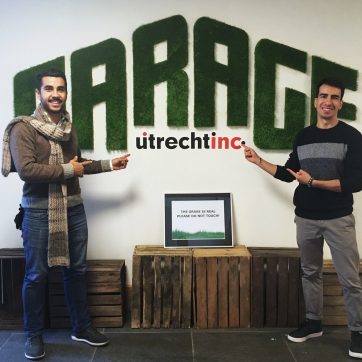
Every year many students and young professionals participate in the EIT Climate-KIC education programmes to create innovative business ideas for a more sustainable future. We talked to two of our Journey alumni and Greenhouse participants, Rafael and Francisco, to hear how they want to revolutionise the e-waste sector!
Can you briefly explain your business idea and what makes it special?
WEEE-DO helps householders to sustainably dispose of their unused electrical and electronic equipment (EEE) by providing them with a collection service that is both convenient and personalised. This is done by making use of the well-established delivery networks – food, groceries, goods – in a way that people do not have to step outside of their homes to have a sustainable act. On top of that, if their unused EEE is still working or can be fixed, we reward them for giving away their unused devices with vouchers that they can use in a future order from the delivery company, depending on the device’s condition and market price. Finally, the collected equipment is either recycled or repaired and sold as a refurbished device.
By using already existing delivery networks, we add no extra carbon footprint on the collection of this equipment as we urge delivery companies to take advantage of reverse logistics by maximising their unused storage capacity.
What inspires and motivates you to work on this topic?
WEEE-DO business idea was born when we felt the hassle that was to have our drawers full of old electronic devices that we did not use anymore. Surely, as sustainability-like thinkers that we are, we were aware of the existing recycling points and mechanisms to get rid of those electronics but, in truth, they are so inconvenient – time, location, extra costs do not help. The result is electronic waste being disposed in landfills, exported to developing countries, sold in the illegal market or even incinerated, which fosters environmental and social issues. With that in mind, we wanted to take action by our own means and move towards a circular economy concept applied to a worldwide high demand for new technology products.
What are your biggest challenges at the moment and what helps you to tackle them?
As upcoming young entrepreneurs, setting up a business with both a clear strategy and value proposition presents itself as the biggest challenge, especially when it comes to dealing with human behaviour. Forming partnerships with potential key partners are also challenges when establishing new circular concepts which ought to set up a win-win situation for the involved parties. Nonetheless, we are comfortable with it since it is part of the process towards becoming an original and crucial player in the e-waste management market. We admit that we are loving it. Our focus is currently on the creation of both a solid story and added value that we can provide to all our stakeholders. For that, we count with the help of EIT mentors and other industry experts that have been guiding us since we laid the first stone in the WEEE-DO foundation.
Are there already any learnings you want to share?
Luck is something one should search and work for. Through EIT Climate-KIC programme The Journey, we were presented with an opportunity to develop a climate-driven entrepreneurial project. Consequently, it simply made sense to just take the ball and run with it. We are doing our best to expose ourselves to the world – events, networking activities, discussions, meetings, etc. – as there is always something valuable that one can extract from a quick comment, chat or idea. Our learning process just increases the more input we get. What one needs to be is brave and take the first steps towards a goal as nobody is going to get things done for you, even though that implies making mistakes on the way. But what are mistakes really? We see them as part of the maturing and learning processes.
What are your main goals for 2019 and how do you want to achieve them?
We are now starting the EIT Climate-KIC Greenhouse Programme. Our biggest goal is to have a minimum valuable product and a pilot test set during this year. There are several initiatives out there to help entrepreneurs develop their ideas and EIT Climate-KIC is one of the players that one should aim at collaborating with. Another goal we have for this year is getting in the EIT Climate-KIC Accelerator Programme, once we have a more concrete and adamant business model. Until then, we will take our time to experiment and develop WEEE-DO as much as we can. We count on the help of EIT Climate-KIC to enhance our project and form partnerships to make this project come true.
Read more about WEEE-DO at www.weee-do.nl

